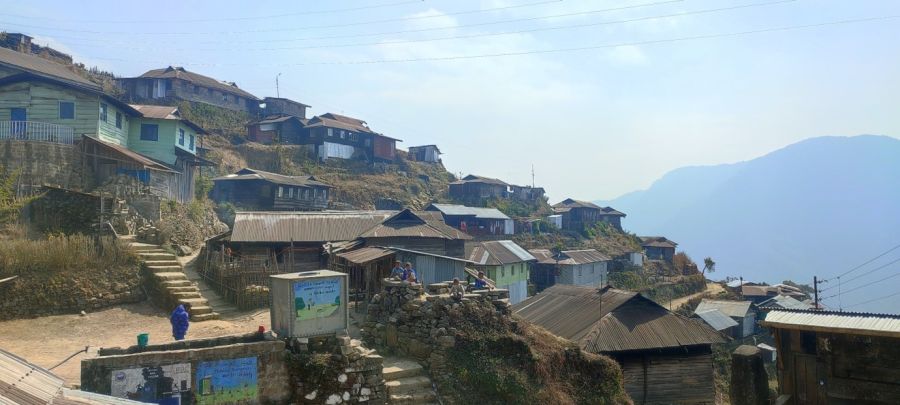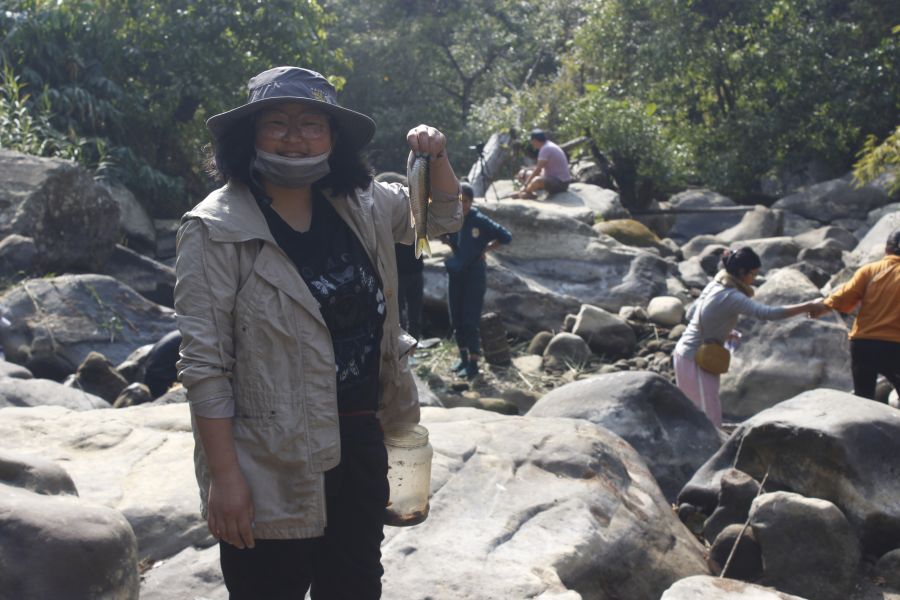Dr Rajindra Puri, anthropologist from the University of Kent in the UK (Middle, front row) and Hegumbe, an elderly native of Poilwa village (4th from R, front row) seen with some of the participants during the training course on ‘Documentation of Traditional Knowledge (TK) of Aquatic Resources (AR) and their use’ held at Poilwa village in February, 2023.
Vishü Rita Krocha
Kohima | March 29
Perched atop a hill and surrounded by lush green forests, Poilwa meaning ‘dwellers on the top’ earned its name for its strategic location of being placed at the top, overlooking land, water, people and a host of other villages that are home to the people of the Zeliang tribe. This is according to Hegumbe, an elderly native of the village who previously served as the Head Gaonbura for 15 years.
He also grew up fishing and is well versed with the traditional method of fishing, which, he professes is an inheritance from their ancestors and has been practiced since time immemorial. With two important rivers—Tepuiki and Duolum running through the village, Poilwa is a true paradise for fishing. In the past, the village community indulged in all forms of fishing including methods that are not so environment-friendly and proved to be harmful to the fish population.
However, in a significant milestone in the year 2022, the Poilwa Village Council has put a blanket ban on all destructive means of fishing including dynamite fishing or fish bombing. This initiative has been instrumental in preserving the spawning ground for the fish population.
 A partial view of Poilwa village.
A partial view of Poilwa village.
As a result, in the last one year, the village has also witnessed the increase of fish population simultaneously with the intervention of the Indo-German Bilateral Cooperation Project “Protection and Sustainable Management of Aquatic Resources in the North Eastern Himalayan Region of India” (NERAQ). NERAQ aims to ensure a full and effective participation of indigenous people and local communities in all decision making and further strengthen the knowledge and management capacities of state and local stakeholders for climate-friendly management of aquatic freshwater ecosystems.
In this connection, a four-day training was also conducted at Poilwa village from February 14-18, 2023 as part of the Project. The Indian Ministry of Environment, Forest & Climate Change (MoEFCC) in partnership with Deutsche Gesellschaft für Internationale Zusammenarbeit (GIZ) is implementing the project with funding support from the German Federal Ministry for the Environment, Nature Conservation, Nuclear Safety and Consumer Protection (BMUV) under the International Climate Initiative (IKI). The overall project objective is to strengthen the conservation and sustainable use of the unique aquatic ecosystems in the region, which are the basis of life for millions of people.
In Poilwa, where fishing was once rampantly practiced without taking any sustainability measures into consideration, the decision to allow fishing only by using the traditional methods has already reaped positive results. Puilung Nlang, a native of Poilwa village testifies to this by saying, “we have seen a lot of increase in the fish population, since the imposition of the ban last year.”
Preserving traditional knowledge for conservation
During the four-day training course on “Documentation of Traditional Knowledge (TK) of Aquatic Resources (AR) and their use” at Poilwa village, Lead Trainer, Dr Rajindra Puri, an anthropologist from the University of Kent in the UK, observed that conservation of aquatic resources in the village is already happening.
In his words, “GIZ has already initiated a couple of important things”, pointing to the new livelihood options involving aquatic resources that people can invest in or expand on. The other thing he said was the community themselves deciding to ban all those forms of fishing technique that are potentially unsustainable. “Perhaps the establishment of a fish sanctuary could help as well, even though there are now rules in place that are serving the purpose of conservation. I think there's great potential,” he noted. He is aware that the village community is not hugely dependent on fish for their livelihoods, but he said, “Maybe it could be a fallback when other resources are scarce.”
 Pema Yangden Lepcha, one of the participants displaying her catch during the demonstration of community fishing using the traditional method as part of the training.
Pema Yangden Lepcha, one of the participants displaying her catch during the demonstration of community fishing using the traditional method as part of the training.
In relation to the fish sanctuary, he also noted that, “in some ways, the village may not be representative of the rest of Nagaland or the North East, but if they can have success here and if that can get around, maybe others will follow.”
He was particularly impressed with how the community let the small fishes go to supplement the fish population during the demonstration of community fishing that was part of the training. He also felt that what the village is currently doing in terms of conservation is quite enough for now. Every community, he further noted, “will have their own issues and their own particular circumstances and they will have to find their own ways of managing their resources.”
As far as Poilwa village is concerned, he enjoyed meeting people and was grateful for their participation in making the course a success. Noting that people seemed proud of their community, he said he felt a certain kind of happiness and satisfaction being there. “That kind of solidarity, and having a meaningful life in the community, where they are proud of who they are and what they do. I think those kinds of things help them so much,” he expressed.
Having a strong confident community with a good governance structure, Dr Puri underlined, will lay the foundation to deal with whatever problems that come up in the future. “That kind of social organisation and social structure, the community is intact and functioning and the culture is strong and people are proud of their identity. That lays the groundwork. These are elements that promote resilience and resilience is something that the community needs when they don’t know what’s going to happen,” he expounded.
The four-day training saw the participation of the village community members, staff of GIZ and Nagaland State Biodiversity Board as well as researchers, lecturers, students representing different organisations and institutions such as ATREE, Martin Luther Christian University, Shillong, IORA Ecological Solutions, YARD (Youth Action for Rural Development) and Kohima Science College, Jotsoma.
During the course of the training, participants were introduced to Traditional Knowledge and given insights on several methods such as freelisting and pilesorts, community mapping and ground truthing, participant observation, interview techniques, using video and audio technology, etc., accompanied with numerous activities in relation to the subject.






